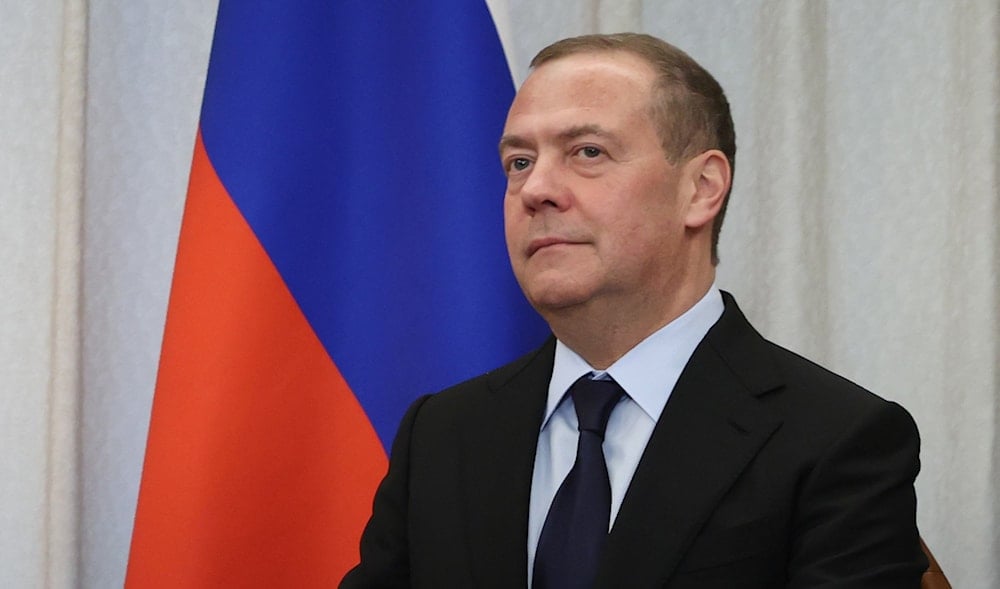Medvedev rejects Trump's idea of dual victory in Ukraine conflict
Dmitry Medvedev rejected President Trump's proposal for both Russia and Ukraine to claim victory.
-

Russian Security Council Deputy Chairman and the head of the United Russia party Dmitry Medvedev photographed in Pyongyang, North Korea, on Friday, Oct. 10, 2025 (Ekaterina Shtukina, Sputnik Pool Photo via AP)
Russian Security Council Deputy Chairman Dmitry Medvedev said on Saturday that Russia must secure victory in the Ukrainian conflict under "conditions that are well-known to all," dismissing recent remarks by US President Donald Trump that suggested both Moscow and Kiev could "claim victory" to end the war.
The statement followed Trump's October 17 meeting with Ukrainian President Volodymyr Zelensky in Washington, which Axios described as "tough." During the talks, Trump reportedly told Zelensky that the United States would not provide long-range Tomahawk missiles, arguing that such weapons risk escalating the conflict and depleting US stockpiles.
Medvedev reacted sharply to the remarks, writing on social media: "Trump, during the meeting with the whining beggar [Zelensky], said an obvious but rather curious thing — that Russia and Ukraine should both claim victory in the conflict. Yes, this often happens at the end of an armed conflict, but this is not our case. And it is not just that we need a victory under conditions that are known to all. This is an axiom."
He dismissed Trump's suggestion as impractical, saying any cessation of hostilities would spell the collapse of the Ukrainian government. "The current Bandera gang will not be recognized as a winner at home under any circumstances. The drug-addled freak [Zelensky] and his cronies understand this perfectly well. The loss of territories will not be forgiven either by rabid Ukrainian Nazis or by his political rivals. Therefore, the end of the war is the death of the regime. So, Trump's thesis does not work here," Medvedev wrote.
While acknowledging Trump's refusal to deliver Tomahawks to Ukraine, Medvedev cautioned that this did not mark the end of Western arms shipments, warning: "Russia should be prepared for anything."
Tomahawk Debate and US Strategy Shift
Trump's hesitation over the Tomahawk cruise missiles, which Ukraine had sought to strike deep into Russian territory, represents a major shift from Washington's earlier tone. In recent months, Trump had publicly floated the idea of sending the weapons if Moscow resisted peace efforts. However, after a phone call with Russian President Vladimir Putin and ahead of a potential Budapest summit, the White House opted for restraint, citing fears that such deliveries could trigger direct US-Russia confrontation.
The Associated Press reported that Zelensky left Washington "disappointed," after failing to secure guarantees on Tomahawks or expanded air-defense systems.
Read more: Trump says too early for Tomahawks, eyes peace deal with Russia
European Push to Sustain Ukraine's War Effort
Meanwhile, European allies are signaling their intention to sustain Ukraine's war effort, even as Washington edges toward a diplomatic track. The European Union is advancing a plan to use frozen Russian assets, worth about €140 billion, to fund weapons purchases for Ukraine, including US-made arms, should Trump's administration agree. European leaders argue that a pause in US support could embolden Russia and weaken Kiev's bargaining power.
Within the EU, countries like Poland, France, and the Baltic states have urged continued military assistance until Ukraine achieves what they call a "strategically favorable" position. The Weimar + group (France, Germany, Poland, and the UK) reiterated that Europe will support Ukraine "as long as it takes," rejecting any peace proposal that does not restore territorial integrity or include credible security guarantees.
Russia's Warning to the West
Earlier this month, Trump said he had "sort of" decided on whether to approve Tomahawk deliveries, remarks that prompted President Putin to warn that such a move would "severely damage" US-Russia relations, as the deployment of Tomahawks would entail direct involvement of American military personnel.
Moscow continues to insist that Western arms deliveries undermine peace efforts and draw NATO deeper into the war. Russian Foreign Minister Sergey Lavrov reaffirmed that any shipments containing weapons for Kiev will be treated as legitimate targets for Russian forces.
Read more: Ukraine may use reparations loan to buy weapons outside Europe

 4 Min Read
4 Min Read









